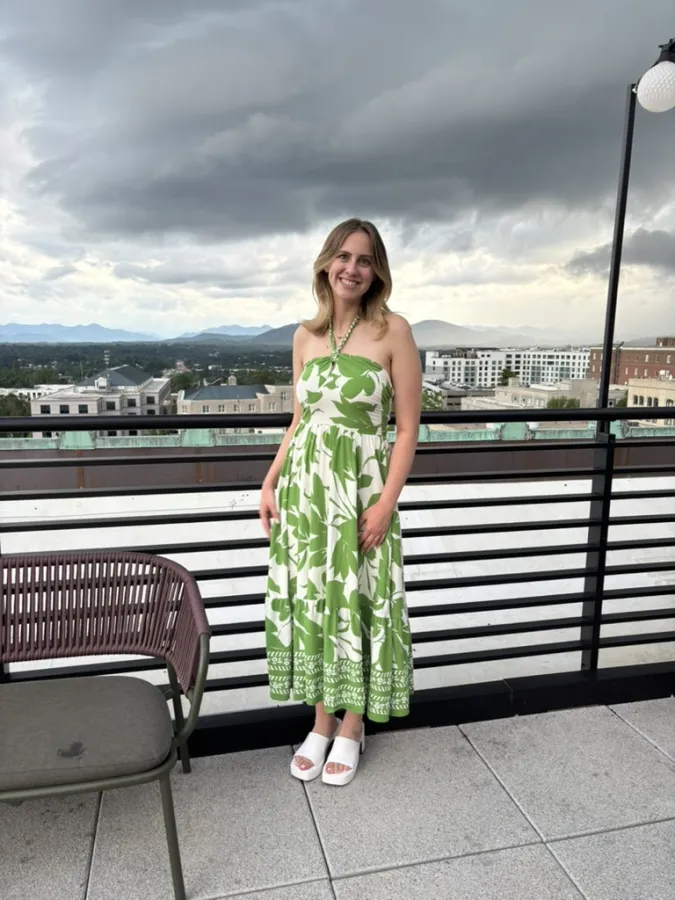Abby Guise '26

Over the past 4 years, Abby Guise ’26 has become a cornerstone of Swarthmore’s music community, performing in the Wind Ensemble and Orchestra, taking private piano lessons, and serving as a teaching assistant for Music Theory (Supertonics). An Honors Music Minor, she's found room to grow as a musician and student within the supportive environment of the Music Department.
Guise grew up in Davidson, North Carolina, in a home where music was ever-present—her father was a pianist and filled the house with melodies. She began developing her own musical skills, learning the piano starting at age 7 and playing clarinet during middle and high school. But upon entering college, she assumed that part of her academic life would come to a close, even if she often returned to the piano as a way to decompress.
When choosing classes at the start of sophomore year, Guise wanted to take advantage of the full spectrum of liberal arts education offered at Swarthmore. She spoke with her father about branching out, and he suggested she register for a Music Theory class. “I went in not knowing much about it,” recalls Guise, “but thanks to Professors Jon Kochavi and Andrew Hauze, I completely fell in love with it.”
From that semester onward, Guise’s engagement with music deepened. She joined the Wind Ensemble and began to study piano more seriously through Music 048—a program offered by the Music Department which subsidizes private lessons for qualified music students. “Music used to be something I just did,” says Guise, but at Swarthmore she found a deeper connection to it. The ensemble quickly became a meaningful community. “Making music and having fun with people who are also making music–that’s been such a special and lasting experience.”
After taking courses in music theory, history, and ethnomusicology, Guise has gained a more profound understanding of how music works and how it shapes the world. She fondly recalls “gamelan day” in MUSI 011 and Music as Oral Tradition, when students explored musical traditions from around the world. “Music is now beyond something I just do,” she says. “It’s something I want to keep doing and take with me for the rest of my life.”
Guise has found fulfillment as a Music Theory teaching assistant, and relishes in watching other music students grow.
“Seeing their musical knowledge and appreciation develop, seeing things just click–that’s been really cool.”
Guise also reflected on how learning theory has developed her own musicianship. “My dad can just sit down and play based on chords, embellishing as he goes. Studying theory has helped me start to understand how to do that, too.”
Her coursework in music history has transformed how she listens to and analyzes music. For her Honors Comprehensive Exam in Music, she is combining Medieval and Renaissance Music with Music Theory. “I’ve always found that period fascinating,” says Guise. “I recently went to a museum and was amazed that I could recognize the notation in some of the exhibits and actually read it.”
In the fall semester, Guise joined the Orchestra, and will perform Holst’s The Planets on clarinet at this semester's concert. “It’s been intense,” she laughs, “but so much fun.”
Guise’s music studies have spanned a range of thought-provoking classes, including Music as an Oral Tradition with Professor Tracey Stewart and Music and War with Professor Barbara Milewski, which she described as challenging but deeply important. “It’s powerful to see how music can be used as both a weapon and a source of hope,” she says. “That class gave me a new understanding of music’s abilities, powers, and uses.”
Looking back on her time at Swarthmore, Guise expressed deep gratitude for the musical opportunities that have nurtured her growth.
--
“Everyone in the music department is so supportive and passionate. I’m forever grateful for that first semester I took Music Theory—I’ve become completely enamored with it.”
Favorite music course at Swarthmore: Music 012 Harmony Counterpoint and Form 2.
Favorite music-making experience at Swarthmore: Wind Ensemble.
What you’ll miss most about Swarthmore: The community! Not just the students, but also the special relationships I’ve been able to form with professors.
What sound or noise do you love? The lifting sound from the last note of a piano piece.
What sound or noise do you hate? Clashing chords (when people miss the accidentals and you can tell…)
What's the last song/piece you played on your phone? ‘The Story’ by Conan Gray.



